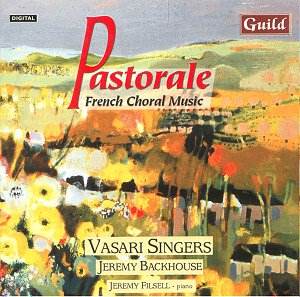Pastorale: French Choral
Music
Debussy: Trois Chansons de Charles d'Orléans;
Saint-Saëns: Sérénade d'hiver;
Delibes: Les Norwégiennes*;
Saint-Saëns: Deux Chansons, op.68;
Canteloube: Baïlèro ("Chants d'Auvergne"); L'Amour
de moi;
Fauré: Madrigal, op.35*; Pavane,
op.50*;
Ravel: Trois Chansons;
Delibes: Les Nymphes des bois*;
Saint-Saëns: Hymne au printemps;
Massenet: Chansons des bois
d'Amaranthe*.
 Vasari Singers/Jeremy Backhouse,
Jeremy Filsell
(pianoforte).
Vasari Singers/Jeremy Backhouse,
Jeremy Filsell
(pianoforte).
 Guild GMCD 7199 [77'
03"]
Guild GMCD 7199 [77'
03"]
Crotchet

The composers range from the well-known to the very well-known, but their
partsongs, with or without accompaniment, are a closed book to most listeners.
Rather than presenting a chronological sequence, or at least putting together
all the pieces by the same composer, the Vasari Singers have chosen, as listed
above, a programme based on maximum variety, alternating styles and periods,
songs with piano and ones without, pieces for males only, females only and
full choir.
The trouble is, the initial enthusiasm I felt on reading the programme and
the very full notes rather cooled as I actually listened. For one thing there
is a wide gap between the works by Debussy and Ravel, whose austerities require
repeated and concentrated listening (though Ravel's Trois beaux Oiseaux
du Paradis is a beautiful little piece) and the burbling charm of Delibes
and Massenet. The former, with his filigree piano writing and operetta-like
melodies seems delightful at first but both his pieces are far too slender
to sustain their length. Massenet, writing in the same vein, is more succinct
and so more enjoyable. I don't know if these two extremes will appeal to
the same listener, at least not on the same occasion, and switching back
and forth continually instead of just once, half-way through, doesn't make
it any easier.
So another problem is that not all the music is very good. Saint-Saëns's
Sèrénade d'hiver is delightfully imaginative, and the
op.68 songs are harmonically resourceful if melodically unmemorable, but
Hymne au printemps, after a lively start, is incredibly doleful and
plodding, quite missing the joy of the words that it sets. I shan't be returning
to that again.
The real gem is the Fauré Madrigal, a beautiful example of
his passionate coolness. The Pavane is well-known and much loved in
its orchestral version, but was this piano score intended for performance
or rehearsal? Jeremy Filsell certainly makes a good case for it (he plays
well throughout but the acoustic makes the piano sound glassy above mezzo-forte).
No choir has yet convinced me that the choral parts are other than skilfully
pasted onto a piece already complete in itself.
The Vasari Singers are good but they do sound very English. This is in part
because they fail to relish the pungency of the typical French vowels, especially
the notorious "u". "On-fwee" for enfuit may pass muster in the schoolroom,
but this is a professional recording. It is also because their style of voice
production is that of the English cathedral choir, too lacking in natural
vibrations for this repertoire.
Texts are provided, with translations that are both stilted and inaccurate.
To get "Slide, O slide, I am beside you, Ice is danger beautiful" out of
Glisse, glisse, traineau rapide, La glace est perfide shows a certain
misdirected imagination, and I always thought roses were roses, not
lavender.
So I'm afraid this is a record for those who already have a particular interest
in this repertoire rather than the general listener in search of new experiences.
Christopher Howell

